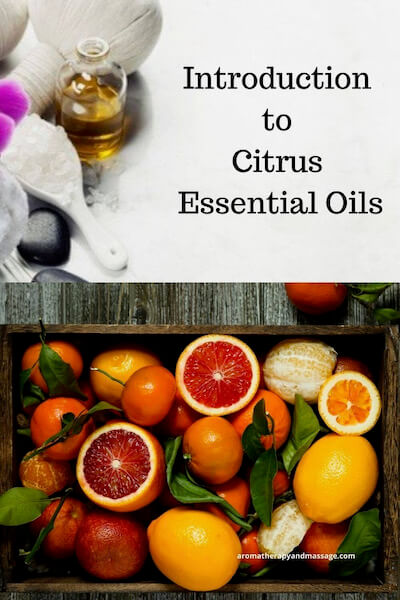- Home
- Essential Oil Profiles
- Citrus Essential Oils
As an affiliate for Bookshop, Amazon, and other programs, I may earn a small commission for products purchased through links. This doesn't affect the price you pay. Privacy policy and disclosures.
Search this site:
Introduction to Citrus Essential Oils
The fruity scent of citrus essential oils is often uplifting and cheery. Most citrus oils are mechanically expressed from the rinds of fruits, although steam-distilled versions of some oils are available.

Expression means squeezing the plant material without using heat to obtain the oils. Historically, the process involved pressing the inverted fruit peel against a spikey ball suspended over a bucket or barrel.
Today's process is mechanized. Whole fruits are tossed around in a large mechanical drum while tiny spikes pierce essential oil glands on the fruit's surface and extract the essential oil. Water flushes the oil away from the fruit. A centrifugal separator then divides the essential oil from the water and any fruit juice.
Although some aromatherapy sources refer to the process as cold pressing, that term is not technically correct. Cold pressing is used to extract vegetable oils from nuts or seeds. (Source: Robert Tisserand) The correct term is cold expression or cold expressing.
This video shows the expression of essential oil from mandarins:

Photosensitivity and Phototoxicity
Some (not all) citrus essential oils contain molecules called furanocoumarins that can react to sunlight and UV rays. Common furanocoumarins include bergapten, psoralen, methoxsalen, and oxypeucedanin.
Oils that cause this reaction are called phototoxic and are said to cause photosensitivity, meaning skin can become red, blistered, or worse. It's important to know which citrus essential oils are phototoxic.
Shelf Life and Oxidation
Expressed citrus oils have a shorter shelf life than most distilled essential
oils. Most sources recommend using them within one to two years of
purchase.
Also, due to their (+)-limonene content, these oils can
oxidize quickly when exposed to air, light, or heat. Oxidized oils can
cause skin sensitization.
To increase the life of the oils and avoid oxidation, you can store them in the refrigerator.
Citrus Essential Oils
Here's a roundup of citrus essential oils, with links to more detailed profiles on this site. Suggested uses are from The Complete Book of Essential Oils and Aromatherapy.
Bergamot Essential Oil (Citrus bergamia)
Bergamot contains bergapten, which causes photosensitivity. However, you can buy bergapten-free bergamot. Look for labels that say bergapten-free or FCF (furanocoumarin free).
Use bergamot to help relieve depression, emotional crisis, fears, insomnia, stress, tension, indigestion, wounds, acne, and herpes sores. The oil is emotionally strengthening.
Grapefruit Essential Oil (Citrus paradisi)
Grapefruit's risk of photosensitivity is low if you use less than a four percent dilution (4 drops in a teaspoon of carrier oil), according to Essential Oil Safety by Robert Tisserand.
Use grapefruit to help relieve cellulite, headaches, migraine, fluid retention, IBS, muscle fatigue, muscle weakness, physical or mental exhaustion, depression, and stress. The oil may promote weight loss.
Lemon Essential Oil (Citrus limon)
The risk of photosensitivity from lemon is low if you use no more than a two percent dilution (2 drops essential oil in one teaspoon carrier oil). A distilled lemon oil without the risk of photosensitivity is available but not common.
Use lemon to help relieve flu, sore throat, laryngitis, anxious depression, nervous tension, exhaustion, fatigue, inability to concentrate or focus, digestive problems, or loss of appetite or to help reduce cellulite.
Lime Essential Oil (Citrus aruantifolia)
Expressed lime oil is phototoxic. Distilled lime oil is not.
Use lime to help relieve digestive problems, loss of appetite, cellulite, sore throat, flu, lethargy, chronic fatigue, and mental exhaustion.
Mandarin Essential Oil (Citrus reticulata)
Mandarin oil does not cause photosensitivity. However, an oil called petitgrain mandarin made from the leaves of the mandarin tree is phototoxic.
Use mandarin to help relieve digestive conditions, stomach ache, constipation, insomnia, sleeping disorders, nervous tension, irritability, and stress and to reduce the appearance of cellulite.
Sweet Orange Essential Oil (Citrus sinensis)
Expressed orange essential oil (the one mostly commonly available) does not cause photosensitivity. However, distilled orange oil does.
Use orange to help relieve constipation, intestinal spasms, fluid retention, anxiety, depression, insomnia, tension, and stress-related conditions and to reduce the appearance of cellulite.
Bitter Orange essential oil (Citrus aurantium)
Bitter orange is not as widely used as other citrus oils. It generally has the same benefits as sweet orange. It has a low risk of photosensitivity as long as the maximum skin use is 1.25%.
Tangerine Essential Oil (Citrus reticulata)
The tangerine is a type of mandarin and the two share the same botanical name. Tangerine essential oil does not cause photosensitivity.
Use tangerine to help relieve nervous exhaustion, stress-induced insomnia, mild muscle spasm, digestive problems, constipation, and flatulence. The oil may also improve how you feel if you are constantly tired, irritable, generally dispirited, or overly anxious and may reduce the appearance of cellulite.
Yuzu Essential Oil (Citrus junos)
Yuzu essential oil does not cause photosensitivity.
Use yuzu to calm nervous stomach cramps, help reduce cellulite, help relieve neuralgia, relieve symptoms of flu and colds, help heal stress-induced skin conditions, and help relieve nervous tension, nervous exhaustion, and chronic fatigue.
Citrus Essential Oil Blends
Citrus Diffuser Blend
- 2 drops lemon
- 2 drops orange
- 1 drop grapefruit
- 1 drop lime
Citrus oils generally have an uplifting aroma. You can experiment with creating you own citrus essential oil blend.
Uplifting Citrus Inhaler
- 5 drops tangerine
- 5 drops orange
- 5 drops lemon
- Blank aromatherapy inhaler
Drop essential oils onto the cotton wick of aromatherapy inhaler.
Buy essential oils at Aromatics International or Rocky Mountain Essential Oils.
Buy massage supplies at Massage Naturals.
Aromatherapy for Massage Therapists Course.
Fruit Photo by Dora Cavallo from Unsplash


